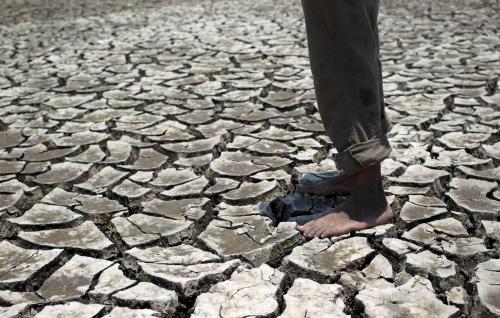The enormous potential for international migration to increase global welfare through increasing global GDP has begun to receive long-overdue attention (see, for example, this paper by Michael Clemens and this blog by Shanta Devarajan). The potential increase in global GDP provides one justification for promoting international migration. Now another justification has been introduced through a pioneering draft paper by Glen Weyl. It argues that certain types of migration may be the best way to significantly reduce global income inequality.
Weyl’s argument proceeds as follows. He starts by noting that the bulk of global inequality originates across rather than within countries. Accordingly, optimal redistribution from a global perspective would mostly feature transfers from richer to poorer countries.
One transfer mechanism is international aid. But flows of aid have historically been nowhere close to the scale implied by optimal redistribution models. Weyl notes that optimal transfers (based on his empirical model and parametric assumptions) should be around $30,000 per U.S. citizen, whereas aid is currently only around $100 per U.S. citizen. One can quibble with the exact amount of aid per U.S. or OECD citizen but the huge discrepancy in actual versus optimal transfers will still remain. At the current scale of transfer, aid is having practically no impact on inequality across countries.
Why is the scale of aid so far below optimal? It may be partly due to perceptions in rich countries that most aid is wasted through corruption and incompetence or is captured by elites and does not flow to the poor. This sort of thinking may explain the efforts of large multilateral development agencies like the World Bank and many bilateral donors who seek to target their assistance to the poorest segments of aid-receiving countries and to improve governance there as well.
An even more important reason for low aid transfer levels may be resistance to the higher domestic taxation that would be implied. Rates of taxation in most OECD economies tend to be below even those implied by optimal domestic redistribution goals. One can only imagine the degree of opposition to raising taxes to meet global redistribution goals.
This is where migration comes in. Compared to aid, migration may be a more effective mechanism to achieve the necessary transfer and redistribution as it does not involve similar scope for corruption or waste. Furthermore, migration does not involve high domestic taxation.
But what sort of migration is best? Weyl’s calculations show that the category of migration that reduces global inequality the most is that from very poor countries to very rich countries. Thus, flows from Mexico and Central America to the United States enhance global equality, as do flows from South Asia to the Gulf Cooperation Council (GCC) countries such as Qatar and the United Arab Emirates. At the same time, flows among relatively rich countries (such as intra-OECD migration) can actually increase global inequality.
The net impact on global inequality of current migration patterns is positive but modest. This is because equality-enhancing flows and equality-reducing flows offset each other. But what if there were ways to promote the former and discourage the latter? What if there was a big shift toward the GCC migration model while keeping total annual migration constant? This could reduce global inequality substantially. Weyl’s calculations show that “migration to those countries does more to reduce global inequality (per person) than would eliminating all inequality within OECD countries.” And further, “because of remittances, these host countries also come far closer in proportional terms to satisfying their transfer obligations to the world’s poorest than do OECD countries.” The dramatic potential of migration is highlighted in a related magazine article written by Weyl and Eric Posner whose title says it all: A Radical Solution to Global Income Inequality: Make the U.S. More like Qatar!
Such a shift would raise other questions, of course. The GCC model gives migrants no political rights and offers them only temporary or guest-worker status—features that appear to have made the bargain acceptable to GCC nationals. While such arrangements may be Pareto-improving, they give rise to ethical concerns. Would OECD citizens accept similar arrangements?
The Brookings Institution is committed to quality, independence, and impact.
We are supported by a diverse array of funders. In line with our values and policies, each Brookings publication represents the sole views of its author(s).







Commentary
Migration as a Way to Reduce Global Inequality
January 28, 2015